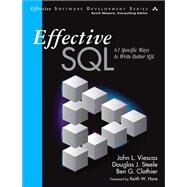Effective SQL 61 Specific Ways to Write Better SQL
, by Viescas, John L.; Steele, Douglas J.; Clothier, Ben G.- ISBN: 9780134578897 | 0134578899
- Cover: Paperback
- Copyright: 12/20/2016
“Given the authors’ reputations, I expected to be impressed. I was blown away! . . . Most SQL books sit on my shelf. This one will live on my desk.”
–Roger Carlson, Microsoft Access MVP (2006-2015)
“Rather than stumble around reinventing wheels or catching glimpses of the proper approaches, do yourself a favor: Buy this book.”
—Dave Stokes, MySQL Community Manager, Oracle Corporation
Effective SQL brings together practical solutions and insights so you can solve complex problems with SQL and design databases that simplify data management in the future. It’s the only modern book that brings together advanced best practices and realistic example code for all of these versions of SQL: IBM DB2, Microsoft Access, Microsoft SQL Server, MySQL, Oracle Database, and PostgreSQL.
Drawing on their immense experience as world-class database consultants and instructors, the authors identify 61 proven approaches to writing better SQL. Wherever SQL versions vary, the authors illuminate the key nuances, so you can get the most out of whatever version you prefer. This full-color guide provides clear, practical explanations; expert tips; and plenty of usable code. Going far beyond mere syntax, it addresses issues ranging from optimizing database designs to managing hierarchies and metadata. If you already know SQL’s basics, this guide will help you become a world-class SQL problem-solver.
–Roger Carlson, Microsoft Access MVP (2006-2015)
“Rather than stumble around reinventing wheels or catching glimpses of the proper approaches, do yourself a favor: Buy this book.”
—Dave Stokes, MySQL Community Manager, Oracle Corporation
Effective SQL brings together practical solutions and insights so you can solve complex problems with SQL and design databases that simplify data management in the future. It’s the only modern book that brings together advanced best practices and realistic example code for all of these versions of SQL: IBM DB2, Microsoft Access, Microsoft SQL Server, MySQL, Oracle Database, and PostgreSQL.
Drawing on their immense experience as world-class database consultants and instructors, the authors identify 61 proven approaches to writing better SQL. Wherever SQL versions vary, the authors illuminate the key nuances, so you can get the most out of whatever version you prefer. This full-color guide provides clear, practical explanations; expert tips; and plenty of usable code. Going far beyond mere syntax, it addresses issues ranging from optimizing database designs to managing hierarchies and metadata. If you already know SQL’s basics, this guide will help you become a world-class SQL problem-solver.
- Craft better logical data models, and fix flawed models
- Implement indexes that improve query performance
- Handle external data from sources you don’t control
- Extract and aggregate the information you need, as efficiently as possible
- Write more flexible subqueries
- Analyze and retrieve metadata using your database platform of choice
- Use Cartesian Products and Tally Tables to solve problems you can’t address with conventional JOINs
- Model hierarchical data: managing SQL’s tradeoffs and shortcomings






